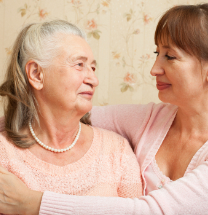 The field of senior care is complex and ever-changing. If caring for a senior parent or client is part of your life, becoming an effective caregiver for seniors is probably something that is important to you. Here are a few tips to help you stay on top of your duties as a caregiver and help you provide the best care possible for those you care for.
The field of senior care is complex and ever-changing. If caring for a senior parent or client is part of your life, becoming an effective caregiver for seniors is probably something that is important to you. Here are a few tips to help you stay on top of your duties as a caregiver and help you provide the best care possible for those you care for.
3 Ways to Become a Great Caregiver
1. Arm yourself with knowledge
Effective caregiving starts with knowledge of your client: it is essential that you understand your loved one’s or client’s health conditions.Every client’s care needs are different and each condition they are dealing with will impact their life in a different way. Having a thorough understanding of how each condition affects them will help prepare you up to best meet their needs.
Seek out information from clients’ physicians, nurses, family and friends. While the clients themselves are your main concern, many of their specific care needs can be better identified by speaking with others who have been involved in their care and have spent time around them. These people may also be able to relay information to you about things that happen when you are not around your loved one or client.
2. Evaluate your boundaries
Know what can and cannot be talked about regarding physical care.Just like every client has different medical needs, every client also has different emotional needs. They will likely have different comfort levels regarding the discussion of their physical care. Carefully address sensitive topics with your client, their family members and other caregivers to ensure that everyone is comfortable with how and when they are discussed. A caregiver should never discuss a client’s physical needs with anyone not involved with the client’s care.
Be the one to start the conversations regarding sensitive caring topics like toileting, bathing or feeding.Many seniors feel embarrassed or ashamed to admit that they need help with these basic daily functions, but it is your responsibility to reassure them that that’s what you’re there for. Starting the conversation and keeping it positive will help them feel more comfortable with the subject.
3. Know your “why” and care from the heart
Any profession runs the risk of complacency and burnout. If you’re not feeling passionate about your work as a caregiver, it will show in your interactions with clients, and it may be time for you to revisit the reasons why you chose to work as a caregiver in the first place. Perhaps it was because you value the wisdom and experience of the elderly and you believe that they deserve respectful care? Or maybe it was because you just love helping others. No matter your reason, keeping it at the forefront of your mind can help you be at your best every day.
Remember the positive impact you are able to make in another person’s life and on their family.Seniors are some of the most vulnerable members of our society. There is nothing more important than being the steady and trustworthy hand for someone when they are vulnerable. As a caregiver, you become a part of your clients’ and their families’ lives and you have the capacity to brighten those lives with your kindness and reliability. It is a relationship and a responsibility you should treat with the utmost respect.
As time goes by, it’s normal to start thinking of caregiving as your “job,” but if you find yourself falling into that habit, try to alter your mindset and think of caregiving as something you wholeheartedly want to do, not just something you need to do. One of the ways to get yourself out of a rut is to tend to your clients with a purpose in mind each day. Ask yourself, “How can I make my clients’ quality of life better?” or, “How can I improve the bond of trust between my client and me today?” As you strive for true excellence, you will find joy in the journey.
As you are working on becoming a better caregiver, you will find that a cooperative attitude will help you gain the trust of those you’re caring for. Trying to put yourself in their shoes will make it easier to be a more patient, honest, humble and responsive caregiver.
Elderlink has a pool of caregivers who provide in-home care for seniors who need assistance with daily living activities. Take a look at our caregiver duty chart to see just one of the ways we support our caregivers in giving the best quality care possible.

There are 3 comments on this post
March 12, 2018
I appreciate your idea of making sure I’m able to know and understand as much as I can about their condition. My father has been living with me since he stopped being able to take care of himself and I’ve been doing my best to help out. Making sure I do everything I can to be informed on how to help would be important.
March 12, 2018
Thanks for explaining that a caregiver is responsible for assisting seniors without making them feel embarrassed. My grandfather has been unable to use the bathroom since he can no longer stand up by himself, and I want to ensure that I hire a senior care service that will help him feel comfortable. Hopefully, I can find someone that will suit my grandfather’s needs.
Comments are closed.